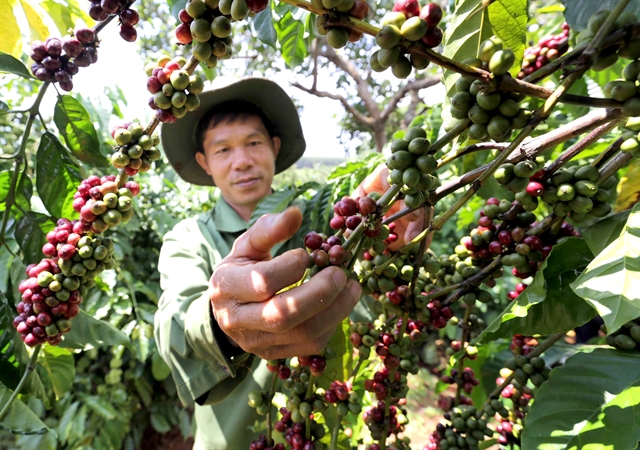
HÀ NỘI — Việt Nam jumped five spots to reach 49th position in the world for sustainable development in 2020 on the UN Sustainable Development Solutions Network, partly thanks to the efforts of local businesses, according to Deputy Prime Minister Vũ Đức Đam.
At the Vietnam Sustainable Development Business Forum 2020 (VCSF 2020) held in Hà Nội on Thursday, Đam said he appreciated the efforts of firms in the last 10 years, especially in how they developed amid the COVID-19 pandemic.
“Lessons from the sustainable development are not only drawn from the pandemic but are also needed to promote the inclusive socio-economic growth in the decade 2021-2030," he said.
The forum, held by the Việt Nam Chamber of Commerce and Industry (VCCI) and the Vietnam Business Council for Sustainable Development (VBCSD-VCCI) with more than 300 delegates focused on discussing key contents on sustainable corporate governance, promoting a circular economy to respond to climate change and enhancing the public-private partnership model.
VCCI chairman Vũ Tiến Lộc said: “In the next 10 years, Việt Nam will keep focusing on three strategic breakthroughs known as improving the quality of the market economy, developing comprehensively human resources, science, technology and innovation, and developing the system of synchronous and modern economic and social infrastructure.”
Caitlin Wiesen, Chief Resident Representative of the United Nations Development Program (UNDP) in Việt Nam, said: “We cannot achieve the Sustainable Development Goals (SDGs) without business as they are the backbone of any economy."
“The completion of the SDGs could open up a global market opportunity worth at least US$12 trillion by 2030," she added.
Wiesen emphasised that businesses play an important role in addressing the challenges of climate change and poverty reduction. In the context of the pandemic, she said the UNDP is working with partners, including Government agencies, non-governmental organisations and businesses, to help firms operate "greener, cleaner and more resilient to achieve the SDGs in the decade of action through 2030."
Binu Jacob, CEO of Nestlé Vietnam and co-chairman of VBCSD, said: “2020 is a year of many challenges and fluctuations. The COVID-19 pandemic and the impact of climate change remind us how vulnerable and interconnected the world we live in.”
He added the business community needed to co-operate for sustainable development to bring long-term and stable prosperity to the entire society.
At the forum, Nguyễn Quang Vinh, general secretary of VBCSD said: "Regardless of business size or model, the circular economy is the key to success and sustainable development for enterprises in Việt Nam."
Attending the forum online, Peter Bakker, chairman of the World Business Council for Sustainable Development (WBCSD), said in the new normal state, countries need to pursue new directions, especially promoting sustainable development for the country's future.
Bakker said businesses had three priorities to overcome the effects of the pandemic known as ensuring the safety and health of employees and customers, focusing on building a new normal and promoting sustainable development.
He said countries would miss out on huge development opportunities if they don’t take the time of the pandemic to change.
He mentioned a recent report by the Business and Sustainable Development Commission that the pursuit of sustainable development goals could create 230 million jobs in Asia by 2030 and open new market opportunities worth $5 trillion.
He said the market opportunity for developing and emerging countries like Việt Nam was about $1.1 trillion.
Therefore, Việt Nam should exploit the opportunities associated with sustainable development goals to reap the rewards, he said.
The chairman also suggested a bio circular economy model for Việt Nam, as agriculture is an extremely important economic component, contributing 15 per cent to the country's GDP.
Taking advantage of the opportunities in this sector, Việt Nam can build a bio circular economic model to open up market opportunities worth $7.7 trillion while the model could also play a key role in the fight against climate change, biodiversity loss and resource scarcity.
Bakker emphasised that sustainable development must be Việt Nam's top priority to realise the commitment to reduce 8 per cent of greenhouse gases by 2030.
Holly Bostock, Corporate Affairs Director, Heineken Vietnam also said the best circular economy model was using a holistic approach to create sustainable environmental value such as reducing carbon emissions, protecting water resources and utilising resources.
Bostock said through the circular economy model, the firm last year created 212,000 new direct and indirect jobs, contributing 0.95 per cent of local GDP.
Top sustainable businesses in different industries were also honoured at the event on Thursday. — VNS
Xem thêm: lmth.strepxe-man-teiv-ni-eulav-elbaniatsus-etaerc-nac-ymonoce-ralucric/772528/ymonoce/nv.swenmanteiv